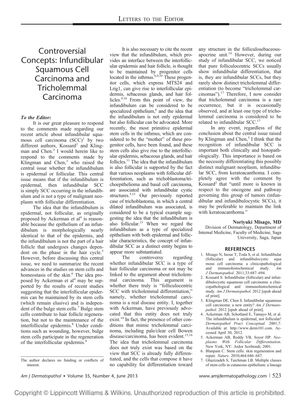Controversial Concepts in the Classification of Infundibular Squamous Cell Carcinoma and Tricholemmal Carcinoma
May 2013
in “
The American Journal of Dermatopathology
”

TLDR The author now believes tricholemmal carcinoma is a rare type of infundibular squamous cell carcinoma and more research is needed on these tumors.
The document from June 1, 2013, addresses the controversy surrounding the classification of infundibular squamous cell carcinoma (SCC) and tricholemmal carcinoma, focusing on whether they are distinct entities with follicular differentiation. The author revisits their stance on the nature of the infundibulum, considering it to have both epidermal and follicular characteristics based on recent skin stem cell studies. While initially skeptical, the author now recognizes tricholemmal carcinoma as a rare but related form of infundibular SCC. The differentiation of infundibular SCC from keratoacanthoma is highlighted as clinically significant. The author concurs with calls for further research into the genetic and molecular mechanisms of these tumors.



